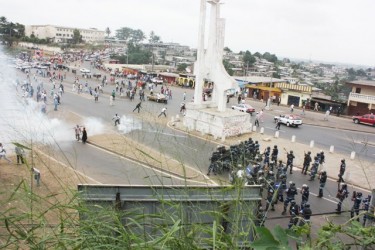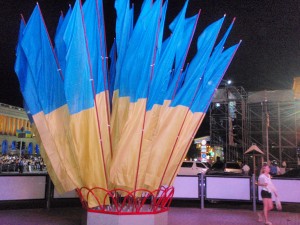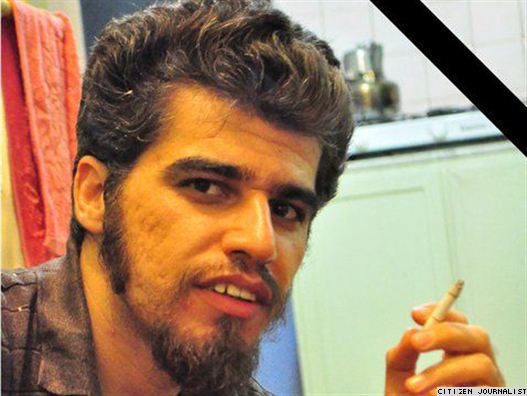World renown linguist and public intellectual Noam Chomsky calls for the immediate release of Shane Bauer and Josh Fattal, who Iranian border guards detained while on a recreational hiking trip in Iraqi Kurdistan. He offers to testify to their good character and record of advocating for social and environmental justice. Shane and Josh have been unjustly detained since July 31, 2009. So far they have been treated as political collateral. They were told their case was political after just over one month. It is time they receive compassion and are allowed to return to their families.
Category: February 2011

Protests in Gabon have failed to make a dent in the international news cycle as all eyes are still turned towards the Egyptian crisis. Mohamed Keita of the Committee to Protect Journalists (CPJ) was wondering if “fake news wasn’t drawing real censorship” in Gabon, as he discussed the closing of the 1st private Gabonese TV channel, TV+. According to M Keita, the overreaction by the Ali Bongo’s government is a sign of a deeper concern : what was considered ridiculous by Ali Bongo and his partisans before seems to have created subtantial political turmoil in this little Central African nation.
The rhetorical strategy of Bongo’s camp seems to consist of the total denyial of the opposition party.
“Gabon: Political crisis: Uprising of the people happening now; poor districts of Nkembo, Cocotiers, Gare-Routière, Atong Abè. One serious wounded.”
In the last five days, the country has witnessed excivil unrest. But IQ4News, a columnist style magazine website dedicated to African related issues,noticed that Protests in Gabon “have gone largely unnoticed by the media because of the focus on Egypt.”
Mass Protests in Libreville and the UNDP building attack
Thanks to locally based activists, there has a been a coverage of the events, and the latter was advertised through different social networks.
Last saturday a demonstration was organised at Carrefour Rio in Libreville, the Capital city. More than 2000 Mba Obame’s partisans went to protest against Ali Bongo’s government and faced the public forces.
This demonstration was followed by violent clashes between Mba Obame’s partisans and Ali Bongo’s Police forces, who were trapped by groups of demonstrators in slums near the place where the demonstration started.

Twenty years since Ukraine’s independence, a generation has grown up for whom the USSR, with its oppression of any dissent and a system of total fear, is nothing but a history textbook term. However, a recent wave of political repressions that began in Ukraine in 2010 has sparked widespread comparisons with the country’s totalitarian past.
Arrests of government officials who served under former Prime Minister and current opposition leader Yulia Tymoshenko began less than a year into the presidency of Viktor Yanukovych. Among those accused of corruption [ENG] are ten of her senior aides, a former Interior Minister and an opposition party leader Yuriy Lutsenko. Tymoshenko herself has been recently denied a trip to Brussels [ENG], due to an ongoing criminal investigation.
In addition to ex-government officials and opposition leaders, the list of professions that have recently become dangerous in Ukraine includes civic activists, entrepreneurs, journalists, bloggers, and even writers. This trend has prompted some analysts to speak of a systematic crackdown on dissent [ENG] rather than a widespread campaign against corruption launched [ENG] by the current President.
While the mainstream media have been providing consistent coverage of the cases against former senior state officials and the opposition, reports of numerous arrests and pressure on the not-so-prominent figures have been sporadic. In fact, most chronologies of political repressions against “ordinary people” have been attempted by bloggers, independent journalists, and cyber-activists.
Among the first ones to make such an attempt is Diana Makarova (LJ user diana-ledi), a journalist-turned-blogger. On Jan. 21, 2011, she put together the available information and came up with more than 40 names of those who have been detained or pressured since December 2010. Among them are participants of the 2010 entrepreneurs’ Tax Protests [ENG], accused of damaging state property, 15 activists of the nationalist organization “Tryzub” (charged with blowing up an illegally-installed monument to Joseph Stalin), activists of political party “Svoboda” (same charges), Ukrainian writer Maria Matios, poet and magazine editor Marina Bratsylo and her husband Yuriy Noga (charges unclear), blogger Olena Bilozerska (see this GV post), head of a regional branch of political party “People’s Self-Defense” (charges unclear), and a Zaporizhzhya history student not connected to any political organization, Eduard Andryushchenko (LJ user did-panas23), who had been gathering information about Ukrainian nationalist movements for his thesis.
Below are a few translated excerpts from the chronology posted on Makarova’s blog [RUS]:
On Dec. 10, 2010, ARRESTS OF ENTREPRENEURS involved in the organization of the [Tax Protests] HAVE BEGUN. Charges include damaging marble tiles where the tent city had been set up. In Kyiv, a participant of the entrepreneurs’ [protests] Sergei Kostakov has been detained. Sentenced to two months. The court hearing took place with no lawyer present.
[…]
Jan. 10, 2011. Some 15 leaders of “Tryzub” have been detained. […] There’s no way to communicate with those arrested, it is not known where they’re being kept, their relatives and lawyers are being prevented from visiting, nothing can be passed to the detainees.
[…]
Around the same time […] Eduard Andryushchenko, who is not officially connected to either “Svoboda” or “Tryzub”, was arrested. After three days of interrogations, the [young man] was released. But the police were waiting for him at the exit. After this second arrest Eduard Andryushchenko disappeared. The police kept his location secret for about a week.
[…]
Jan. 13, 2011. Four members of organization “Tryzub” (Philip Taran, Roman Khmara, Sergei Borisenko, Rostislav Vinar) are being transferred from [Ivano-Frankivsk] to [Zaporizhzhya] (supposedly for an investigation-related experiment). Vasily Labaichuk is already there. After that their destiny remained unknown despite searches at the [State Security Service], detention areas, etc. Relatives and a lawyer were prevented from visiting the arrested.
[…]
Jan. 17, 2011. Roman Khmara has been found. He is being kept in Leninskiy District Police Department. He’s been beaten up by representatives of Rohatynskyi District Police Department, since the day of the arrest the lawyer hasn’t been allowed to visit him, he is in need of medical treatment.
[…]
Jan. 20, 2011. [Chernovtsy]. Brutal detention of an entrepreneur Lidiya Gaina, one of the participants of the [Tax Protests]. She was called to appear before police as a witness, and was then taken to court, without any explanation. As a result of such detainment, the woman had an asthma attack and heart problems. […]
Other bloggers who tried to spread information included Kyiv-based LJ user ax-attilla, who listed [UKR] the arrested activists of nationalist organizations, Yevgeniy Novitskyi from Simferopol (LJ user novitsky), Kyiv-based LJ user klodius, Dnipropetrovsk blogger Andriy Denysenko (LJ user andr-denysenko), LJ userooany-wonderoo, Kyiv activist Andriy Khartanovych (LJ user endryx), Kyiv-based blogger and journalist Olena Bilozerska (LJ user bilozerska), and others.
Members of Maidan.org.ua, a popular Internet hub of citizen activism, have created a wiki-based collection [UKR] of materials on recent political repressions in Ukraine.
One of the website’s activists, Natlaka Zubar (LJ user pani-maidan), wrote this [UKR]:
15 people arrested for political activity and dozens under investigation, and that’s only in one month – is that enough to speak of the beginning of political repressions? I’m sure if [we] don’t scream about it from every corner, the number would grow too fast for the society to be able to realize the scope of the repressions. […]

The Iranian pro-regime and opposition forces have each been battling to claim Saleh Jaleh as their martyr. He was killed by gunfire on February 14 when the opposition demonstrated in Tehran and several other cities.
Sane Jaleh, 26, was a student of dramatic literature at Tehran Arts University. A Sunni Muslim, Sane was from Paveh in the Kurdistan Province.
While Iranian pro-government websites claim he was a Basij militia member, killed by the opposition, opposition sites say he was a protester. Both sides accuse each other of trying to steal Saleh’s identity.
Pro-regime sites published his photo and his Basij membershipcard, while opposition sites published a photo of him with the late high ranking cleric, Ayathollah Montazeri, a leading anti-government figure.
Reza Sajadi, the secretary of Tehran Arts University’s Islamic Association, and a close friend of Sane Jaleh, told the International Campaign for Human Rights in Iran that despite threats made against him, he strongly denies his friend’s membership in the Basij organization.
